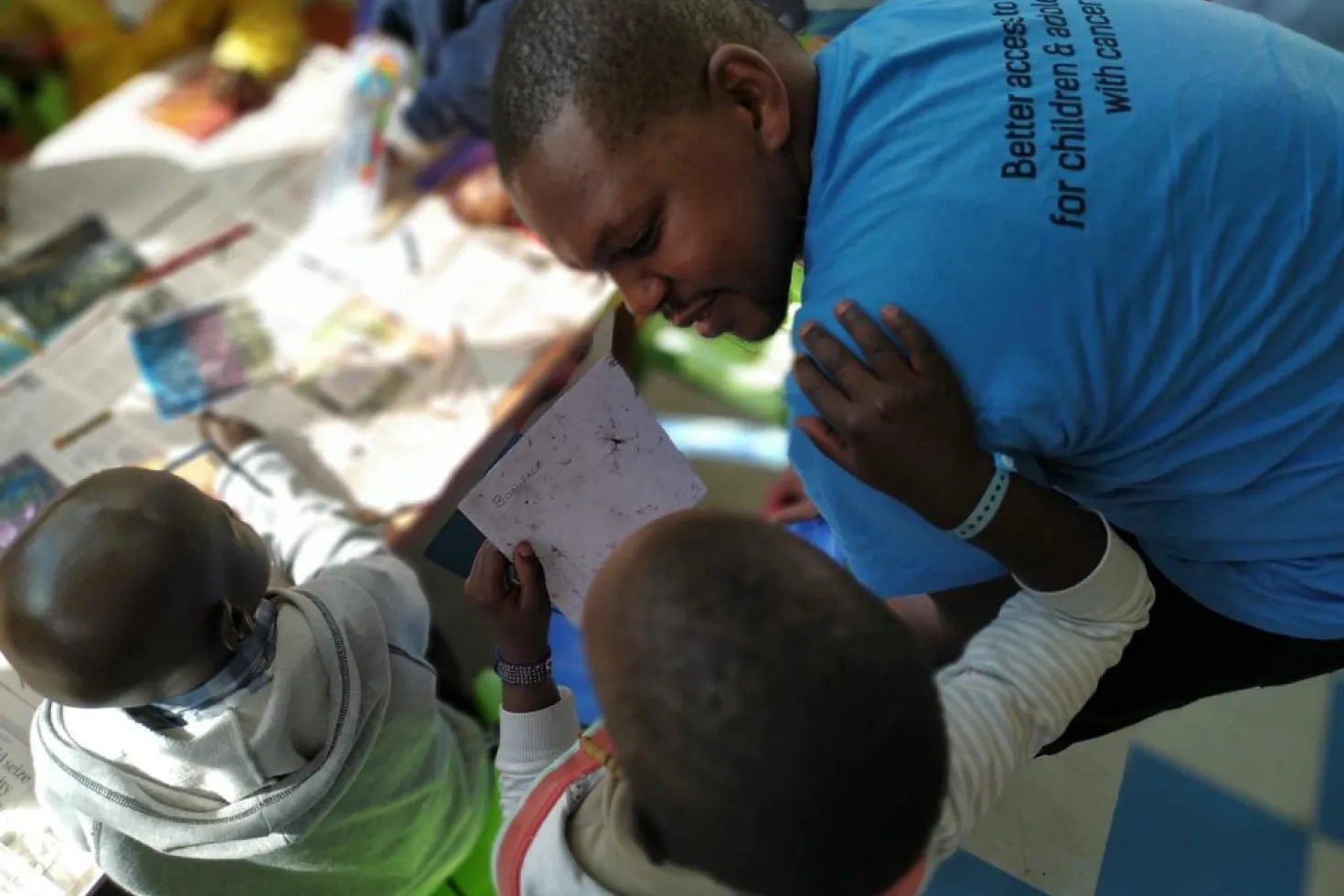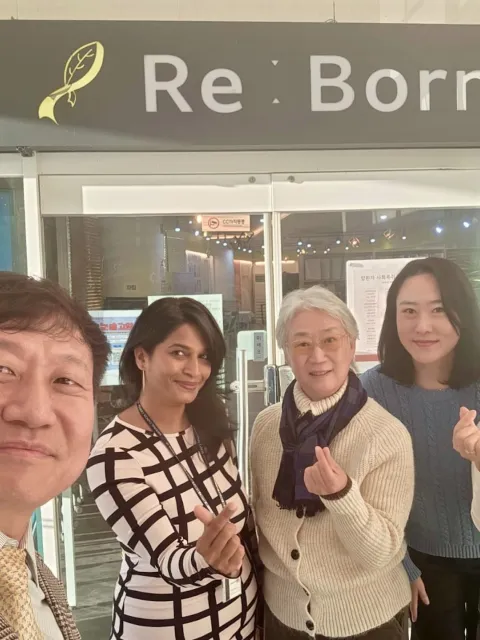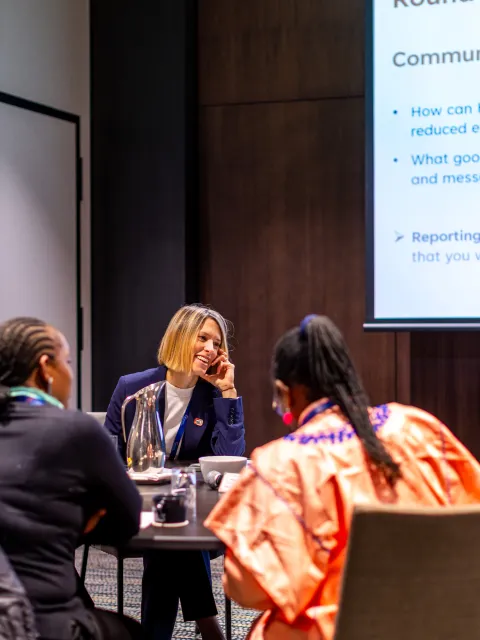Building recognition and support for people who had cancer as children
Sidney Chahonyo from Kenya and João Bragança from Portugal, both affiliated with Childhood Cancer International, spoke to UICC about the ongoing challenges and long-term needs of people who have had cancer as children, from chronic health issues to stigma and barriers in education and work.

"If you are making decisions about childhood cancer, people who had cancer as children need to be at the table. That’s why we say, ‘Nothing for us without us'." – Sidney Chahonyo, Board Member of CCI and KENCO.
HIGHLIGHTS
-
Survivors often live with long-term side effects of treatment, stigma, and barriers in education and employment, with little systemic support.
-
Sidney Chahonyo, Board Member of Childhood Cancer International (CCI) and KENCO, both UICC members, and João Bragança, Immediate Past President of CCI, advocate for recognition and inclusion of survivors’ voices in policy decisions.
-
Childhood Cancer International launched SurNet in 2025 to map survivors globally, gather data, and strengthen advocacy.
-
Some regions have adopted “right to be forgotten” laws, while in low-income settings survivors still struggle to be counted in health systems.
The number of children successfully treated for cancer has significantly increased in recent decades. Yet, not only do stark disparities in survival rates still exist between regions and income levels, for many the end of treatment is not the end of the challenges, which can be more wide-ranging and profound than for adults.
“Children may grow into adulthood with physical, cognitive and emotional side effects derived from the toxicity of treatments,” said João Bragança, Immediate Past President of Childhood Cancer International (CCI), a UICC member organisation. “They may also face social stigma and public policies that discriminate against them.” Around the world, people who experienced cancer as children lack support for these long-term effects, leaving many to manage them alone.
In Kenya, Sidney Chahonyo was 19 when he was diagnosed with nasopharyngeal cancer after repeated misdiagnoses. He underwent chemotherapy and radiotherapy, yet 11 years on he continues to live with the consequences of treatment, including hearing loss.
“When treatment finishes, families are often told to go home and start life again,” he said. “But you are going home to a very different life. You find yourself living with the long-term effects of the drugs, surgery, and radiation. You face stigma when you go back to school, and there is no system to help you reintegrate. For many of us, that is when the real struggle begins.”
Since 2016, Chahonyo has worked to change that reality, first through Hope for Cancer Kids to support children with cancer and their families, and more recently as the first person who has had cancer as a child to sit on the board of CCI. He also sits on the board of the Kenyan Network of Cancer Organizations (KENCO), another UICC member organization.
For him, the task is not only to prevent others from being forgotten once treatment ends, but also to ensure that their experience is remembered, their long-term needs recognised, and their voices included in decisions that affect them.
Chahonyo also serves on the steering committee of CCI’s Global Survivor Network (SurNet), a new international network for people who had cancer as children. Established in 2025 by CCI, the network aims to work with the International Society of Paediatric Oncology (SIOP) to map both the individuals affected and the services available to them, while also creating a platform for their voices to be heard.
“We still don’t even know how many there are worldwide,” said João Bragança, also co-chair of SurNet. “Estimates range from six to ten million, but there is no comprehensive data, especially in low- and middle-income countries. Our first step is identify them and understand what support they require.”
The right to be forgotten… or remembered
In parts of Europe and Latin America, advocacy has led to right to be forgotten laws, ends discrimination in the financial and public system for those who had cancer (for example when applying for insurance or loans, the right to adopt children, or access state funds to pay for higher education). Portugal, Spain, Belgium, the Netherlands, Peru, and Chile are among the countries that have passed such public policies.
For many in Africa, however, the challenge is the opposite. Bragança explained: “In high-income countries, people are asking for fair access to insurance or mortgages. In some low- and middle-income countries, many are still struggling to be counted at all.”
Chahonyo described this as a “right to be remembered”: “If someone’s experience is not being registered in health systems or statistics, they cannot access tailored follow-up care or be included in planning,” he explained. “We are essentially invisible. We finish treatment, but we don’t exist in the data. Without recognition, there is no support.”
Beyond these systemic issues, the physical and psychological legacy of cancer is lifelong. Concerns about professional and family life are common, as are fears of recurrence, which can resurface with every medical appointment. People who have experienced cancer also report difficulties in returning to school or work, where stigma and misunderstanding persist. For these reasons, many people who have had cancer do not embrace the word ‘survivor’.
Chahonyo explained that these challenges can follow people throughout their lives. “When you say you had cancer, people make assumptions, that you won’t be as effective at work or that you’ll always need time off. And that’s just the professional environment… In some communities people still see cancer as a curse.”
Mental health is a central concern. “People may look fine from the outside but carry the fear internally,” he added. In some high-income countries, psychological services exist but are not integrated into survivorship care; in low-resource settings, they are rarely available at all.
For both Bragança and Chahonyo, systemic change requires inclusion. “Some want to advocate, others prefer not to talk about their experience,” said Bragança. “But even those who remain silent still need support. Advocacy has to represent everyone.”
“That’s why we say, ‘Nothing for us without us,’” Chahonyo explained. “If you are making decisions about childhood cancer, people who had cancer as children need to be at the table. Doctors can ask about pain on a scale of one to ten, but they have never felt that pain. Doctors and policymakers can measure outcomes, but only those who lived through it can describe the realities of life after treatment, can bring that perspective.”
Earlier this year, SurNet co-organised a webinar on fertility preservation to raise awareness among clinicians and policymakers of the importance of safeguarding reproductive choices even before treatment starts. The network is also aligning its advocacy with WHO’s Global Initiative for Childhood Cancer and national cancer control plans, helping to ensure that the long-term needs of people who had cancer as children are integrated into strategies for cancer care.
“Life after cancer is lifelong,” said Chahonyo. “It is about education, jobs, families, and dignity. That is why people who had cancer as children must be part of the conversation from the very beginning.”
WHO has set the goal of a 60% survival rate in childhood cancer by 2030, which means every year more children survive cancer. Sidney Chahonyo and João Bragança are among the growing voices urging policymakers to recognise and meet their long-term needs.
Last update
Thursday 02 October 2025
